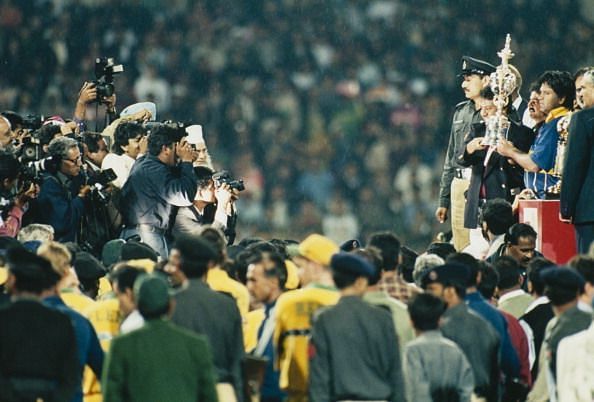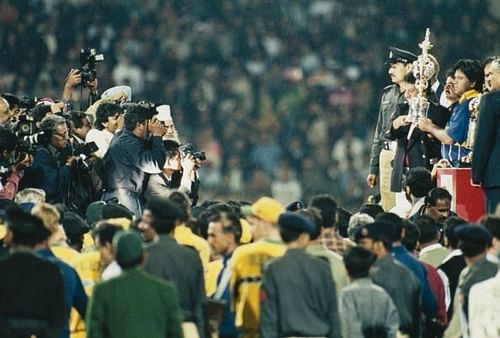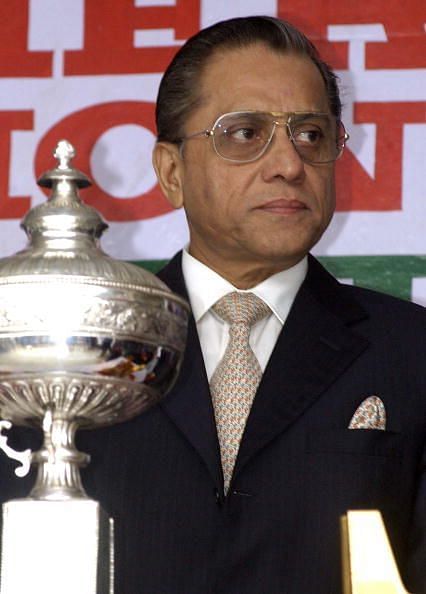
1996 Wills World Cup : From Lord's to the Indian sub-continent

The 1996 Cricket World Cup is often remembered for the fairytale-like campaign of the Arjuna Ranatunga-led Sri Lankan team. The way Sanath Jayasuriya & Romesh Kaluwitharna took advantage of the field restrictions in the first 15 overs would still be fresh in the minds of all those who witnessed that historic tournament.
But the 1996 Wills World Cup (as it was called after the main sponsors Wills), was historic in more than one way. It won’t be wrong to say that this mega event co-hosted by India, Pakistan & Sri Lanka signalled a change in the power equations of cricket. Now, although the Asian subcontinent had witnessed the Cricket World Cup once (in 1987), the game was still largely considered a ‘white man’s burden’.
“We do not want to come to Lord’s for the ICC meetings and just nod our heads like little schoolboys as we used to”
The sacred closed corridors of Lord’s still called the shots in cricket. But the Asians wanted to change that as narrated by an Asian official in the book - The Cambridge Companion to Cricket. The official says, “We do not want to come to Lord’s for the ICC meetings and just nod our heads like little schoolboys as we used to. Now, we come with fully prepared plans and want to be heard as equals.”
One of the most fractious ever meeting of the ICC
One such fully prepared plan was executed in one of the most turbulent meetings of the ICC which took at Lord’s in 1993. England had confidently come to the meeting, thinking that it had the gentleman’s agreement to host the next World Cup in 1996.
The rule was that the successful bidder had to get two-thirds of the votes. Initially, England & South Africa got four votes each, while Pakistan voted for itself. Post this dead-lock each group tried to gather more support and eventually, India, Pakistan & Sri Lanka decided to place a joint bid and South Africa agreed to support the sub-continent countries. Wisden went on to describe this is the most fractious ever meeting of the ICC.
The three Asian countries also targeted the ICC’s Associate Members and offered them 40,000 Pounds more than that offered by England. Recalling that meeting, former Sri Lankan Board Secretary Neil Perera recently said, “Our bid got five votes and England managed four, but we needed a two-third majority. A compromise was made with England opting to back out on the condition that it should get the World Cup in 1999. Similarly, South Africa demanded the hosting rights for the 2003 World Cup and the matter was resolved.”
Formation of the PILCOM and flow of money
Thus, the famous alliance PILCOM (Pakistan India Sri Lanka Organising Committee) was formed with Jagmohan Dalmiya as its convenor. This alliance brought money to the Cricket World Cup like never before. The television rights were auctioned for a mind-blowing sum of US $14 million through Mark Mascarenhas, an unknown agent then.
Everything related to the World Cup was made commercial, so much so that the tournament had an official chewing gum. India & Pakistan made a profit of almost $50 million. Sri Lanka was left behind as far as the profits were concerned since they had not agreed to underwrite the costs due to the fear that the competition might make a financial loss.

Despite this, there was no dearth of bonhomie among the PILCOM countries. This solidarity was to be seen when India & Pakistan fielded a combined Asian XI against the Sri Lankans to compensate for Australia’s refusal to play in the island nation owing to security concerns. PILCOM nations as a whole and India, specifically, had come a long way in the colonial game of cricket.
India & BCCI were the biggest beneficiaries
Not long ago, in 1992 the Board of Control for Cricket in India (BCCI) had a deficit of $150,000. Today, we know that it is by far the richest board. Shrewd Indian administrators capitalised on the fact that the country was the biggest market for cricket. As per a study then, every second person watching the game of cricket was an Indian.
Who could have thought that the board, whose president NKP Salve was once denied few extra complimentary passes for the 1983 World Cup finals by the Marylebone Cricket Club (MCC), was ruling over the gentleman’s game.
And the Wills World Cup which began on the Valentine's Day in 1996 started a power-shift in cricket from the “Clock Tower” of Lord’s to the sub-continent. An earthquake had come in the power circles of cricket, with India at its epicentre.